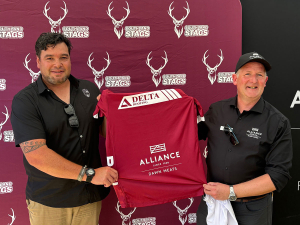A man who allowed his ram’s horn to grow into its face, pushing its eye out, has been banned from owning stock animals for five years.
The man was sentenced at Huntly District Court last week (29 June) after pleading guilty to a charge of failing to provide for an animal's physical, health and behavioural needs.
As well as a disqualification from owning stock animals, the man was also sentenced to 100 hours of community work, and ordered to pay reparations of $104.60, prosecution costs of $209 and court costs of $130.
The charge was filed after SPCA was notified about a flyblown ram at the defendant’s Waikato property in February 2022.
The man’s ex-wife was also charged but was subsequently discharged without conviction.
When SPCA inspectors assessed the adult Wiltshire ram, they noticed its head was lowered to the ground and it appeared to be disorientated with no sense of direction and was visually impaired.
The ram was shaking its head constantly and there was a dark line of discharge down the right side of its face.
The ram’s left horn was curled against its head, causing a raw wound above its left eye. Flies were swarming around the animal’s head, with clear signs of it being flyblown.
Most alarming, says SPCA, was that the ram’s right horn had grown through its face. The horn had entered behind the right eye, which was protruding out of its socket and was black. The area was also severely flyblown.
SPCA interim chief executive Robyn Kiddle says the injury would have caused the ram immense pain, adding that it is distressing to know the owners didn’t act sooner.
“This was a horrific injury caused by overgrown horns that should have been remedied weeks, if not months, earlier,” says Kiddle. “Instead, the animal was neglected and left to suffer in pain and distress, which never should have happened.”
 |
|---|
|
SPCA interim chief executive Robyn Kiddle (pictured) says the injury to the ram should have been remedied earlier.
|
The defendant’s wife, who showed inspectors the ram, said she was aware it had a horn injury, which had affected its vision on one side.
She had noticed the injury at the end of 2021 and had been monitoring it since. She stated that she and the defendant had planned to have a vet euthanise the ram when he returned from being away.
A vet was immediately called to the property by SPCA, and the ram was euthanised.
The woman said she had contacted a vet the week prior to enquire about the cost of euthanasia and dehorning. However, two local vet clinics had no record of this call.
She also claimed she didn’t see anything wrong with the ram’s head, as she thought the horns were circled and blocking its vision.
The woman told inspectors she had never had the ram’s horns cut and did not get close to it as she was scared it would attack her.
The defendant told SPCA he owned the sheep and worked away from home.
Prior to the inspection, he was last at the property two days before SPCA was called. He said that, at that time, he hadn’t noticed the ingrown horn and thought the ram was healthy, which is why he hadn’t sought veterinary treatment.
Kiddle says there were clear signs the ram was in pain and distress, yet nothing was done.
“There was absolutely no excuse to ignore these signs, nor leave it in such a terrible state,” she adds.
The judge also ordered the defendant’s ex-wife to pay reparations of $104.60.




















